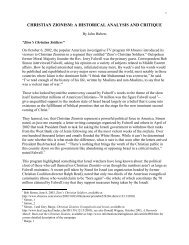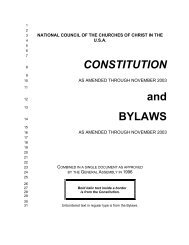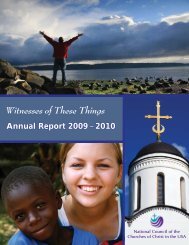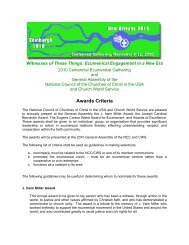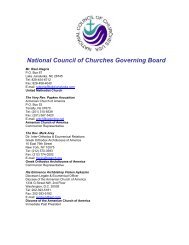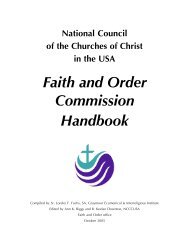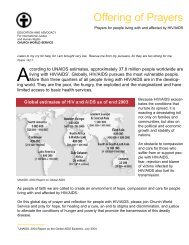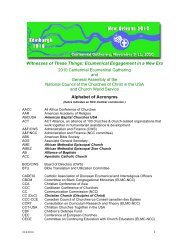Common Agreement on Mutual Recognition of Baptism - National ...
Common Agreement on Mutual Recognition of Baptism - National ...
Common Agreement on Mutual Recognition of Baptism - National ...
Create successful ePaper yourself
Turn your PDF publications into a flip-book with our unique Google optimized e-Paper software.
454<br />
455<br />
456<br />
457<br />
458<br />
459<br />
460<br />
461<br />
462<br />
463<br />
464<br />
465<br />
466<br />
467<br />
468<br />
469<br />
470<br />
471<br />
472<br />
473<br />
474<br />
475<br />
476<br />
477<br />
478<br />
479<br />
480<br />
481<br />
482<br />
483<br />
484<br />
485<br />
486<br />
487<br />
488<br />
489<br />
490<br />
491<br />
492<br />
493<br />
494<br />
495<br />
496<br />
(sacramenti nomen; Inst. 4.14.18). Am<strong>on</strong>g natural signs, God used ―the tree <strong>of</strong> life as a<br />
guarantee <strong>of</strong> immortality‖ to Adam and Eve. So, too, God gave the rainbow to Noah as a pledge<br />
<strong>of</strong> grace towards the earth. Although both tree and rainbow began as natural objects, when they<br />
were ―inscribed by the Word <strong>of</strong> God‖ (inscripta fuerunt verbo Dei) they ―began to be what<br />
previously they were not‖ (inciperent esse quod prius n<strong>on</strong> erant). Am<strong>on</strong>g the miracles that were<br />
divinely given signs, Calvin notes the light in the smoking fire pot (Gen. 15:17), the fleece with<br />
dew (Judges 6:37-8), and the shadow <strong>of</strong> the sundial going backwards (2 Kgs. 20:9-11) (Inst.<br />
4.14.18). These signs were not humanly invented but were given by God, and Calvin<br />
differentiates these from the ―ordinary‖ sacraments that God instituted am<strong>on</strong>g God‘s people,<br />
both <strong>of</strong> the old law and those instituted by Christ in the new law (Inst. 4.14.19-26).<br />
3.b. Sacraments.<br />
i. Sacraments from a Roman Catholic perspective<br />
The sacraments then, especially the Eucharistic sacrifice, are the center <strong>of</strong> the Church‘s<br />
liturgical life. 10 Christ‘s work in the liturgy enables the pilgrim Church to participate ―as by a<br />
foretaste, in the heavenly liturgy‖ such that before the parousia the Holy Spirit dispenses the<br />
mystery <strong>of</strong> salvati<strong>on</strong> in and through the Church‘s prayer and sacraments (CCC 1112). The<br />
sacraments are sacraments <strong>of</strong> Christ founded in the saving mysteries <strong>of</strong> Christ‘s life so that ―what<br />
was visible in our Savior has passed over into his mysteries‖ (St. Leo the Great quoted in CCC<br />
1115). The sacraments are sacraments <strong>of</strong> the Church ―by her‖ and ―for her‖ effectively<br />
instantiating the principle <strong>of</strong> sacramentality. For the Church ―the sacraments make the Church‖<br />
in that they manifest and communicate to human beings the mystery <strong>of</strong> communi<strong>on</strong> with the<br />
triune God (CCC 1118). The sacraments are sacraments <strong>of</strong> faith because they presuppose faith<br />
(prepared by the Word <strong>of</strong> God) and through words and objects they nourish, strengthen and<br />
express faith (CCC 1122-1123). The sacraments are sacraments <strong>of</strong> salvati<strong>on</strong> because they<br />
―c<strong>on</strong>fer the grace that they signify‖ (CCC 1127), bestowing the grace necessary for salvati<strong>on</strong><br />
(CCC 1129). The sacraments are sacraments <strong>of</strong> eternal life because in ―the sacraments <strong>of</strong> Christ<br />
the Church already receives the guarantee <strong>of</strong> her inheritance and even now shares in everlasting<br />
life (CCC 1130).<br />
Catholics also speak <strong>of</strong> the validity and efficacy <strong>of</strong> the sacraments, the latter having been<br />
a sore point <strong>of</strong> c<strong>on</strong>tenti<strong>on</strong> during the Reformati<strong>on</strong>. For a sacrament to be valid it must be<br />
administered according to the intenti<strong>on</strong> <strong>of</strong> the Church to c<strong>on</strong>fer the grace <strong>of</strong> Christ, by a proper<br />
minister, and with the form and matter <strong>of</strong> the particular sacrament. The ministers must be validly<br />
ordained except in the case <strong>of</strong> matrim<strong>on</strong>y where the minister witnesses the sacrament that is<br />
c<strong>on</strong>ferred by the spouses up<strong>on</strong> each other or in baptism where in the case <strong>of</strong> an emergency (not<br />
the normative administrati<strong>on</strong> <strong>of</strong> baptism) any<strong>on</strong>e may baptize if they do so with the Church‘s<br />
intenti<strong>on</strong>. The form al<strong>on</strong>g with the matter <strong>of</strong> the sacrament embraces the appropriate objects: for<br />
example, water, bread, wine, oil, etc., and their corresp<strong>on</strong>ding words or sacramental formulae<br />
(based <strong>on</strong> the New Testament accounts) <strong>of</strong> the Last Supper words <strong>of</strong> instituti<strong>on</strong> for the sacrament<br />
<strong>of</strong> the Eucharist and the Trinitarian baptismal formula.<br />
Sacramental efficacy c<strong>on</strong>cerns the c<strong>on</strong>ferral <strong>of</strong> grace in the sacramental act.<br />
The ―sacraments act ex opere operato (literally: "by the very fact<br />
<strong>of</strong> the acti<strong>on</strong>'s being performed"), i.e., by virtue <strong>of</strong> the saving work<br />
10 There are seven sacraments in the Catholic Church: <strong>Baptism</strong>, C<strong>on</strong>firmati<strong>on</strong>, Eucharist, Rec<strong>on</strong>ciliati<strong>on</strong> or Penance,<br />
Anointing <strong>of</strong> the Sick, Matrim<strong>on</strong>y, and Holy Orders.<br />
12



